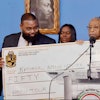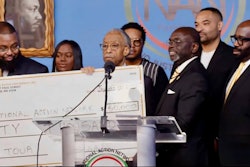 Dr. Steve D. Mobley Jr., assistant professor of higher education at the University of Alabama and expert on the LGBTQ+ experience at HBCUs.
Dr. Steve D. Mobley Jr., assistant professor of higher education at the University of Alabama and expert on the LGBTQ+ experience at HBCUs.
But in the twenty years since that incident, HBCUs have come a long way toward ensuring students have the protections and support they need to truly thrive on their campuses. As more bills restricting the rights of individuals are proposed by legislators across the nation, HBCU leaders and LGTBQ+ scholars and activists are working to shore up HBCUs and make them a safe haven for queer students, faculty, and staff of color.
“I have recently begun to make the argument that HBCUs have always been innately queer spaces, because the etymology of ‘queer’ is ‘different, challenging the norm,’” said Dr. Steve D. Mobley Jr., an assistant professor of higher education at the University of Alabama and an expert on the LGBTQ+ experience at HBCUs. “Educating Black people was queer at one point — so HBCUs have always been queer.”
When Mobley first began to think deeply about the intersection of queerness at HBCUs in 2011, he was an undergrad at Howard University, an HBCU in D.C. He recalled that he told a classmate that HBCUs would never, in his lifetime, host an LGBTQ+ resource center. Eleven years later, six HBCUs have active LGTBQ+ resource centers.
“Six seems low, but they’ve come up so fast,” said Mobley. “I’m also encouraged to see that while they may not have centers, [other HBCUs] are engaging queer students in programming, are present at college fairs for LGBTQ+ students, [and] have queer taskforces. Single-sex HBCUs have trans-admissions policies. But there is a lot of work to be done.”
A large share of that work is led by the Human Rights Campaign (HRC) HBCU Program. Directed by Howard doctoral student Leslie Hall, HRC HBCU leads competency trainings for queer students, faculty, administrators, and allies alike, all for free. They have already engaged with HBCU presidents in their National Leadership Summit and have worked with over 30 HBCUs.















